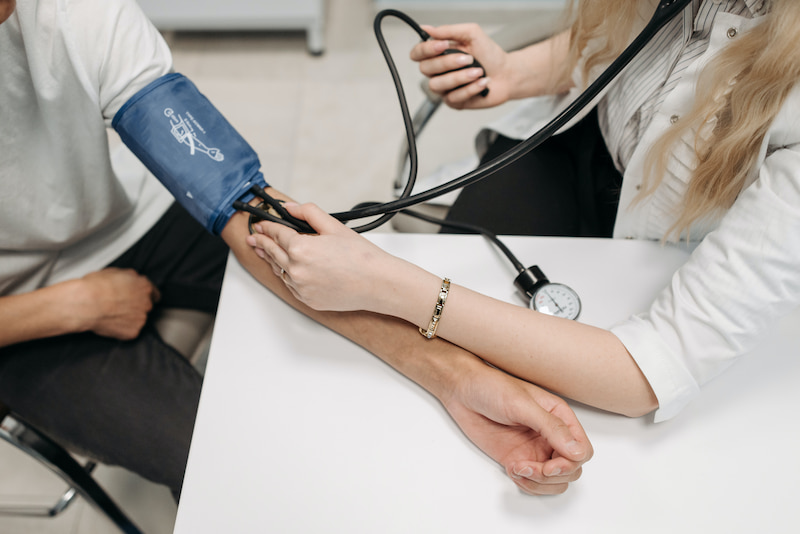
What do we know about high blood pressure and migraines?
The more we know about the relationship between high blood pressure and migraines the more we will be able to understand and treat them.
Let’s explore this connection and how it might impact your life in a serious way!
HBP, or hypertension, is when your systolic (upper number) and diastolic (lower number) blood pressures readings are consistently above the levels your doctor considers healthy (over 120/80, for example) [1]
HBP can be caused by several factors, including genetics, age, family health history, lack of exercise, and poor diet. It can also be influenced by other conditions like diabetes or kidney issues. High BP is not considered a disease in itself; rather it’s typically seen as a classic risk factor for many other conditions [2]
What Is HBP And How Does It Relate To Migraines?
High blood pressure (also known as hypertension) is a condition in which the force of the blood pushing against the walls of the arteries is greater than normal. As a result, the heart has to work harder than usual, and blood flow is constricted.

Elevated BP symptoms
High blood pressure symptoms include:
• Severe headache in the temples or behind the eyes (usually one-sided)
• A heavy throbbing sensation in the head
• Nausea and vomiting
Migraine symptoms commonly start between ages 30 and 40 but can occur as early as childhood or as late as the elderly. The “aura” that people experience before a migraine headache is also quite common in HBP patients, although there are different types of migraine.
HBP does not cause migraines, but they are influenced by it because a series of complex factors may cause the initial conditions of migraine aura and hypertension.
In any case, it has been proven that migraine sufferers have a higher chance of developing hypertension than those who do not experience migraines [3]
What Causes High Blood Pressure?
HBP is usually the result of some other health problem, but it may also be caused by some medications.
It is difficult to answer in that the causes vary among different people. There are some common causes that may increase your chances of developing HBP.
Listed below are some examples of these common causes:
• Smoking cigarettes
• Obesity
• Diabetes
• Lack of physical activity
• Family history of HBP
• Too much salt in the diet
There are many triggers for HBP, so one common cause alone may cause an individual to develop high blood pressure if they do not have additional risk factors. For example, obesity often leads to hypertension, but it may still not happen in the presence of a healthy diet and regular exercise. You should also keep an eye on your blood pressure in winter as some reports suggest cold weather can raise blood pressure.
Can High Blood Pressure Cause Migraines?
HBP can certainly cause migraines. In fact, studies have shown that High BP can be a major contributor to migraines [4]. This is because the two conditions share several of the same risk factors, most notably age and sex. Both high blood pressure and migraines are also known to cause tiredness.
Women with migraines have a higher relative risk of developing High BP as compared to the women who do not suffer from the condition [5]. According to news reports by UPI, [6] with regards to HBP, “Half of all adults 40 years or older have high BP, putting them at risk for heart attack and stroke.” So it is not surprising that some of these people will develop migraines as well.
HBP can increase the likelihood of someone suffering from a headache or migraine because it puts strain on the brain.
The brain has to work harder than usual to pump blood against the resistance. This increased workload on the brain can cause a headache or migraine as well as alter activity within the brain, which may increase the risk of developing migraines.

How Can I Prevent Migraines?
It can be hard to predict when migraines will strike. Prevention is the best way to make sure that you are always able to avoid getting one. Below, we’ve listed some helpful tips for preventing migraine headaches:
Exercise regularly – Physical exercise can help reduce stress and anxiety, which are known triggers of migraines.
Rest effectively – A lack of sleep has also been linked to migraines, so it is essential to get enough sleep each night to prevent them. It is recommended to try and get around 8 hours of sleep per night.
Reduce your salt intake – Salt has been shown to contribute to water retention in the body, which in turn can cause migraines. Try reducing your salt intake to less than 2 grams per day to reduce the likelihood of getting a migraine attack.
Manage stress – Managing stress is an important step in avoiding migraines. Try to minimize the number of stressors in your life and try to avoid getting overwhelmed by trying to accomplish too many tasks at once.
Avoid known triggers – Caffeine, alcohol, and nicotine, If you find that these substances tend to trigger your migraines, it is best to avoid them altogether
Is There Any Medication That Will Help Reduce My Blood Pressure?
Get ready to feel better soon! There are also some medications that you could try.
The following medications might be helpful for you if you suffer from Migraines:
These recommended products from e-surgery can help in migraine treatment.
We recommend talking with a doctor before trying any of these drugs alone or in combination with other treatments.
The following medications might be helpful for you if you suffer from High Blood Pressure:
Check out these treatments from e-surgery that can help lower your blood pressure levels and keep them under control! You should consult with your doctor before making any changes to your treatment plan.
• Ramipril Tablets (find out some common side effects and if Ramipril is over the counter)
• Atenolol Tablets (find out what Atenolol is used for)
Some people find that a change in lifestyle can help to lower their BP. This includes eating a healthier diet, exercising more, and limiting the amount of alcohol they consume.
If you are experiencing migraines, it may be worth exploring the connection between them and your blood pressure. HBP can make a person more susceptible to migraine headaches by making their arteries stiffer, which in turn can cause increased levels of stress on nerves that lead to the brain. If you suspect high BP is causing or worsening your migraines, speak with your doctor about treatments for both conditions.
You might also want to explore some lifestyle changes that will help reduce your risk of developing hypertension, such as eating healthier food, exercising regularly, and getting plenty of sleep every night.
Sources
- NHS Overview On HBP (hypertension) (NHS)
- NHS Hypertension Causes (NHS)
- NCBI Study On The Connection Between Migraine And Hypertension (NCBI)
- NCBI Study On High BP Causes Migraines (NCBI)
- International Headache Society UK Study: Migraine And The Risk Of Incident Hypertension Among Women (Stage Journals)
- US Adults High Blood Pressure (UPI)
Further Reading
- What You Need to Know About Migraine and High Blood Pressure (Everyday Health)
- Does High Blood Pressure Cause Headaches? (Healthline)
- Can high blood pressure lead to headaches? (Medical News Today)






